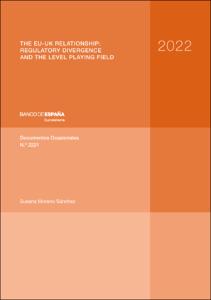The EU-UK relationship: regulatory divergence and the level playing field
Authors
Issue Date
14-Oct-2022
Physical description
19 p.
Abstract
Tras la salida del Reino Unido de la Unión Europea (UE), las políticas adoptadas por el Reino Unido y la UE irán dando lugar con el tiempo a divergencias regulatorias y a la creación de barreras comerciales entre estos dos espacios jurídicos y regulatorios separados. Con el fin de aprovechar los beneficios de la autonomía regulatoria, el Gobierno británico ha emprendido una revisión completa de la legislación de la UE conservada, identificando reformas regulatorias concretas en sectores de alto crecimiento. Existen, sin embargo, algunas limitaciones. En el Acuerdo de Comercio y Cooperación concluido con la UE, el Reino Unido se ha comprometido a respetar determinados estándares europeos e internacionales. En particular, se garantiza un nivel de protección común en determinadas áreas consideradas relevantes para el level playing field, tales como el control de las subvenciones, la fiscalidad, las normas sociales y laborales, así como el medioambiente y el clima, si bien el alcance de dichas garantías varía considerablemente según el área. Por otro lado, las divergencias regulatorias tendrán lugar a expensas del acceso al mercado interior. En este marco, determinadas medidas regulatorias y subvenciones a operadores económicos podrían originar fricciones políticas entre la UE y el Reino Unido, y conducir en el futuro a disputas legales. En la primera reunión del Comité Especializado en Comercio en materia de Igualdad de Condiciones para una Competencia Abierta y Justa y el Desarrollo Sostenible, celebrada el 12 de octubre de 2021, los representantes de la UE y del Reino Unido abordaron asuntos relacionados con el control de los subsidios (la normativa británica en materia de control de subsidios o la propuesta de reglamento de la UE sobre subsidios extranjeros) y subsidios específicos (los regímenes británicos de energía renovable y la Reserva de Ajuste del Brexit de la UE), así como diversas iniciativas regulatorias en materia de normas sociales y laborales, y de medioambiente y clima. Estas discusiones técnicas pueden resultar cruciales para limitar el riesgo de disputas entre la UE y el Reino Unido en el ámbito del level playing field.
Since the United Kingdom’s departure from the EU, policy decisions made by both the UK and the EU will, over time, lead to regulatory divergence and create barriers to trade between the two separate regulatory and legal spaces. The UK government has already undertaken a comprehensive review of all retained EU law, to reap the benefits of its regulatory autonomy, and specific regulatory reforms have been identified in high-growth sectors. Yet there are some constraints. The UK has committed to respecting certain EU and international standards provided for in the Trade and Cooperation Agreement concluded with the EU. Most notably, a common level of protection is secured in certain areas deemed relevant for the level playing field, such as subsidy control, taxation, labour and social standards and environment and climate, although the strength of the level playing field safeguards differs considerably by area. Moreover, regulatory divergence would come at the expense of single market access. In this setting, certain regulatory measures and subsidies granted to economic operators could be a potential source of political friction between the EU and the United Kingdom and could lead to future legal disputes under the Trade and Cooperation Agreement. At the first meeting of the Trade Specialised Committee on Level Playing Field for Open and Fair Competition and Sustainable Development held on 12 October 2021, EU and UK representatives addressed issues related to subsidy control (the UK’s Subsidy Control Bill and the EU’s proposed Regulation on foreign subsidies), specific subsidies (the UK’s renewable energy schemes and the EU’s Brexit Adjustment Reserve) and several regulatory initiatives on labour and social standards and environment and climate. These technical discussions could prove crucial in limiting the risk of EU-UK disputes arising in level playing field issues.
Since the United Kingdom’s departure from the EU, policy decisions made by both the UK and the EU will, over time, lead to regulatory divergence and create barriers to trade between the two separate regulatory and legal spaces. The UK government has already undertaken a comprehensive review of all retained EU law, to reap the benefits of its regulatory autonomy, and specific regulatory reforms have been identified in high-growth sectors. Yet there are some constraints. The UK has committed to respecting certain EU and international standards provided for in the Trade and Cooperation Agreement concluded with the EU. Most notably, a common level of protection is secured in certain areas deemed relevant for the level playing field, such as subsidy control, taxation, labour and social standards and environment and climate, although the strength of the level playing field safeguards differs considerably by area. Moreover, regulatory divergence would come at the expense of single market access. In this setting, certain regulatory measures and subsidies granted to economic operators could be a potential source of political friction between the EU and the United Kingdom and could lead to future legal disputes under the Trade and Cooperation Agreement. At the first meeting of the Trade Specialised Committee on Level Playing Field for Open and Fair Competition and Sustainable Development held on 12 October 2021, EU and UK representatives addressed issues related to subsidy control (the UK’s Subsidy Control Bill and the EU’s proposed Regulation on foreign subsidies), specific subsidies (the UK’s renewable energy schemes and the EU’s Brexit Adjustment Reserve) and several regulatory initiatives on labour and social standards and environment and climate. These technical discussions could prove crucial in limiting the risk of EU-UK disputes arising in level playing field issues.
Publish on
Documentos Ocasionales / Banco de España, 2221
Subjects
Brexit; Relación UE-Reino Unido; Acuerdo de Comercio y Cooperación (ACC); Igualdad de condiciones (level playing field); Autonomía regulatoria; Divergencia regulatoria; Brexit; EU-UK relationship; Trade and Cooperation Agreement (TCA); Level playing field (LPF); Regulatory autonomy; Regulatory divergence; Unión Europea; Comercio internacional; Derecho internacional; Países de la UE; Reino Unido
Appears in Collections:












